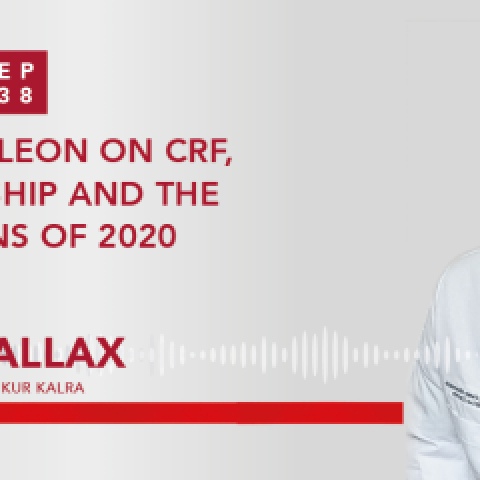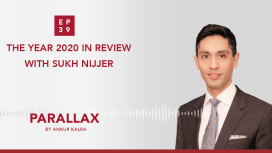
In the late 1980s, shortly after he left the NIH, Dr Martin B Leon founded the non-profit organisation, Cardiovascular Research Foundation (CRF). At the beginning, CRF had almost no funding or people, but it had a concept of bringing together an academic community to follow the device development cycle from inception to inclusion. Today, CFR is a global entity, and its events are attended by hundreds of physicians/researchers worldwide.
In the Season 2 finale, Ankur Kalra is joined by the legendary Martin B Leon, Professor at Columbia University, director of the Transcatheter Cardiovascular Therapeutics and chairman emeritus of the CRF.
In this in-depth discussion Dr Leon talks about what he believes is behind the success of CRF and the lessons he learnt from disappointments and mistakes along the way. Dr Leon stresses the importance of collaborations on a global scale. He talks about his plans for the future and the issues that were highlighted by the events of 2020. Ankur asks Dr Leon about his role as a mentor and about the qualities he is looking for in a mentee.
What makes Dr Martin B Leon tick? What is his message to cardiologists and/or researchers at the beginning of their careers? How did the pandemic and his work as a clinician in New York change his perspective?
Hosted by @AnkurKalraMD.
Produced by @RadcliffeCARDIO. Submit your questions to Ankur via: podcast@radcliffe-group.com.

Which COVID19 patients require risk stratification with a stress test? What are the take-home messages for physicians taking care of patients diagnosed with COVID19? What were the key trials of 2020? What can we learn from the negative results of the STRENGHT study? How have studies like STOP-AF influenced clinical practice?

After the #MedBikini campaign provoked by a misogynistic study that scrutinized female doctors’ social media posts, this episode is about creating a safer environment for female healthcare professionals.

The charity organisation, Women as One is an agent for women and men to be part of medicine that is built on talent, rather than a privilege. Roxana and Ankur discuss the role of mentorship and family-friendly work environment in mending the broken house of cardiology. Roxana talks about the practical tools that are available for women to take the next steps in their career and achieve their goals.

Dr Kalra asks Dr Mauri about early influences and her traineeship with legendary interventionalists, the late Donald Baim and Richard Kuntz. Dr Mauri talks openly about her decision-making process and the importance of selecting your priorities and committing to them. Ankur asks Laura about her decision to go into industry. Laura shares her thoughts on medical innovations and meeting urgent needs with unique perspectives.
What is Dr Mauri’s advice for a young cardiologist? How did she balance research and patient care? What are the questions that helped her decision making? How does Dr Mauri think about innovations in medicine?

Brigham and Women’s Hospital’s Health Equity Committee decided to confront the status quo by asking: How is racism on a structural level present within our walls?
Ankur Kalra’s guests Michelle Morse (Founding Co-Director of EqualHealth and Assistant Professor at Harvard Medical School) and Lauren Eberly (Cardiology Fellow at the University of Pennsylvania) are co-authors of a retrospective study that demonstrated what had previously only been observed: That black or brown heart failure patients ended up in general medicine rather than specialised cardiology services. Following the publication of the study in November 2019, the Health Equity Committee started to roll out anti-racism trainings and to work on objective admission guidelines to mitigate biased behaviours.
Aarti Bhatt (Assistant Professor of Medicine at the University of Minnesota), member of the Minnesota chapter of Campaign Against Racism, talks about their initiative to support projects that have a positive impact on local communities on a global scale.

In this week’s Parallax, Dr Kanaa’N, the director of the program, and Dr Lahorra, chairman of the Heart, Vascular & Thoracic Department of Akron General introduce the listeners to the foundations of their program and the paradigm shift brought by TAVR.

Ankur Kalra asks Grant W Reed, Director of the Cleveland Clinic’s STEMI program, to reflect on the actions they took and the challenges of delaying cardiovascular procedures in the wake of the coronavirus pandemic. Dr Reed offers insight on the factors that influenced the Cleveland Clinic’s STEMI policy for COVID-19. Ankur and Grant discuss the triage considerations for patients with structural heart disease and the steps the clinic took to protect its healthcare workers.

In this edition of Parallax Dr Kalra asked Dr Rosenbaum about the influences that shaped her choices as a writer and as a healthcare professional. Dr Rosenbaum opens up about her childhood and how she connected to her grandfather through writing and medicine. We learn about Lisa’s first day at medical school and her latest writing project.

Jagmeet P Singh, associate chief of the cardiology division at Massachusetts General Hospital and professor of medicine at Harvard Medical School joins Ankur Kalra for a deep conversation about his journey across three continents. Dr Singh talks about the importance of choosing fulfilment over success. We gain more insights on the recent late-breaking trial, MADIT-CHIC focusing on cardiac resynchronization therapy. Ankur asks Jag about his experience of being on the other side of the healthcare system and his enrolment in the since halted remdesivir trial.

Prof Michele Senni is Director of Cardiology at Papa Giovanni XXIII Hospital, Bergamo Italy. He contracted COVID-19 himself and in this latest podcast he meets with Ankur Kalra, MD to discuss his personal experience in dealing with patients and COVID-19 in Europe’s outbreak epicentre.
Hear them discuss the burden on healthcare, patient selection, the importance of testing and PPE and how COVID has resulted in a reduction of acute myocardial infarction and heart failure in patients.

In this latest episode, Ankur Kalra, MD meets with Andrew Sauer, MD, co-author of an upcoming paper in US Cardiology Review on COVID-19 and Cardiovascular Disease that provides a concise and current summary of cardiovascular complications from COVID-19.
Hear them discuss the latest issues surrounding the pandemic, the known cardiac implications and the rapidly emerging data.

After the #MedBikini campaign provoked by a misogynistic study that scrutinized female doctors’ social media posts, this episode is about creating a safer environment for female healthcare professionals.

The charity organisation, Women as One is an agent for women and men to be part of medicine that is built on talent, rather than a privilege. Roxana and Ankur discuss the role of mentorship and family-friendly work environment in mending the broken house of cardiology. Roxana talks about the practical tools that are available for women to take the next steps in their career and achieve their goals.

Dr Kalra asks Dr Mauri about early influences and her traineeship with legendary interventionalists, the late Donald Baim and Richard Kuntz. Dr Mauri talks openly about her decision-making process and the importance of selecting your priorities and committing to them. Ankur asks Laura about her decision to go into industry. Laura shares her thoughts on medical innovations and meeting urgent needs with unique perspectives.
What is Dr Mauri’s advice for a young cardiologist? How did she balance research and patient care? What are the questions that helped her decision making? How does Dr Mauri think about innovations in medicine?

Brigham and Women’s Hospital’s Health Equity Committee decided to confront the status quo by asking: How is racism on a structural level present within our walls?
Ankur Kalra’s guests Michelle Morse (Founding Co-Director of EqualHealth and Assistant Professor at Harvard Medical School) and Lauren Eberly (Cardiology Fellow at the University of Pennsylvania) are co-authors of a retrospective study that demonstrated what had previously only been observed: That black or brown heart failure patients ended up in general medicine rather than specialised cardiology services. Following the publication of the study in November 2019, the Health Equity Committee started to roll out anti-racism trainings and to work on objective admission guidelines to mitigate biased behaviours.
Aarti Bhatt (Assistant Professor of Medicine at the University of Minnesota), member of the Minnesota chapter of Campaign Against Racism, talks about their initiative to support projects that have a positive impact on local communities on a global scale.

In this week’s Parallax, Dr Kanaa’N, the director of the program, and Dr Lahorra, chairman of the Heart, Vascular & Thoracic Department of Akron General introduce the listeners to the foundations of their program and the paradigm shift brought by TAVR.






